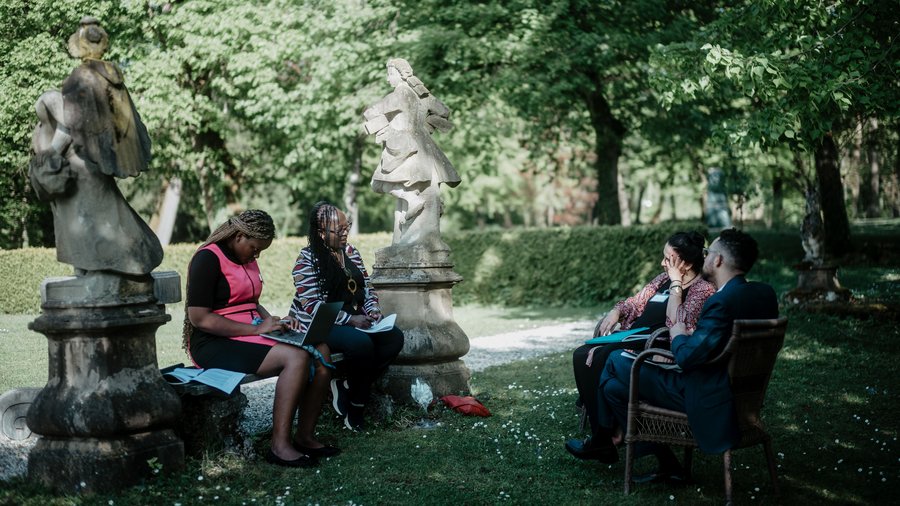They are young, outspoken, and climate-conscious: More and more young people in Africa are getting involved in climate protection because they don’t want to leave their future up to others
This article has been translated from German, and was originally published by the Salzburger Nachrichten. The original article can be downloaded here.
Climate change has many faces in Africa: In Tunisia, it’s the images of dried-up reservoirs. In Zimbabwe, aerial photos show a hundred dead elephants lying on the dusty ground of Hwange National Park. Looking at Africa, one sees not only the fatal consequences of increasing global warming, but also the injustice it brings: The continent is only responsible for about three to four percent of global CO₂ emissions but nevertheless feels the effects of climate change quite drastically.
Out of this injustice arises resistance: In Africa, more and more young people are raising their voices for climate protection and challenging international politics. They are outspoken, committed, and often facing difficult conditions; these are people like Collins Shava from Zimbabwe and Khouloud Baghouri from Tunisia.
“Climate change influences our seasons, our agriculture, and our productivity. It affects our entire way of life,” stated Collins. The 32-year-old works in the African Wildlife Foundation to ensure that young people are included in political decision-making processes.
“Young people play a central role in the debate on climate justice. Why? They are the future leaders - the presidents, ministers, members of parliament, and local authorities. Therefore, they must become familiar with climate justice topics at an early stage,” said Collins during a conversation at the Salzburg Global "Africa Forum: Centering an African Vision for a New Multilateral Future" in Schloss Leopoldskron.
Africa possesses a significant share of raw materials needed for a climate-friendly future. Minerals such as cobalt, lithium, and copper are indispensable for electric vehicles, solar panels, and wind turbines. “When young people sit at the negotiating table, they can negotiate better conditions for Africa. Because these resources are not renewable - once they’re gone, they’re gone,” said Collins. “Young people must have a say so that we don’t sell our future for short-term profit but secure it for future generations.”
Zimbabwe is not only rich in resources - the country also hosts a variety of wild animals and is among the most biodiverse nations in southern Africa. Among them are the famous “Big Five”: elephants, rhinos, buffaloes, leopards, and lions. “Climate change is increasingly causing conflicts between wildlife and humans,” said Collins. Due to prolonged droughts, there are fewer water sources. This leads to more incidents with crocodiles: “When people go to fetch water, they are killed by crocodiles because there is less and less space for both humans and animals,” stated Collins. Climate change alters the relationship with nature. This frightening reality is prompting many to act, said the 32-year-old. “We see that more and more young people are advocating for nature and climate protection.”
Tunisia is particularly known for its active civil society in Africa. “This generation of young people has survived the Arab Spring, political change, the COVID-19 pandemic, and natural disasters - these events have built great resilience in the spirit of youth,” said Khouloud Baghouri. The young climate activist from Tunis has brought the perspectives of young people into international climate negotiations as the African Union Youth Ambassador for Peace and a member of the Tunisian Young Climate Negotiators Group.
Especially in recent years, climate change has had a profound impact on Tunisia. “It is challenging,” said Khouloud. “In 2022 and 2023, we had a high risk of desertification and drought due to the extreme summer temperatures.” Tunisia’s economy relies heavily on agriculture. If the rain does not fall, this has disastrous consequences, especially for people in rural areas. “This creates conflicts over resources. People fight over who has access to land and water,” said the activist, who is also committed to gender equality. “We know that in the struggle for resources, women are particularly affected, as they face increased gender-based violence and discrimination,” said Khouloud, who currently works as national gender ambassador for UN Women in Tunisia.
Despite these challenges, many young Tunisians are engaged in start-ups and initiatives dealing with water scarcity or recycling. “Even though these are often smaller initiatives, they help with prevention and advocate for climate protection measures,” explained Khouloud.
As the former African Union Youth Ambassador for Peace, she has worked extensively with various ministries. “Those in decision-making positions are not particularly young. In the past, it was rather difficult to have access to these spaces. But now I feel that there is more openness to young people’s ideas.” The keyword is trust, she said: “Many think young people lack enough expertise, equating youth with inexperience.”
Collins Shava and Khouloud Baghouri themselves prove that this assumption is wrong. Their message is clear: Anyone who talks about the future of the planet cannot ignore Africa’s young people.
Salzburg Global Fellows Collins Shava and Khouloud Baghouri attended the Pathways to Peace Initiative on "Africa Forum: Centering an African Vision for a New Multilateral Future" in April 2025.
This article is part of our Annual Spotlight: “Centering Africa." Across our sessions and events in 2025, Salzburg Global is highlighting the central role that the African continent will play in global development now and in the next decades. As demographic trends across much of the world project a future of older and less productive economies, the African continent stands out for its growing youth population, dynamism and innovation. In reimagining an international system that better responds to the needs of the 21st century, it is our hope that Salzburg Global can play a small but meaningful role in centering African ideas, innovations, and perspectives in global forums like ours.


